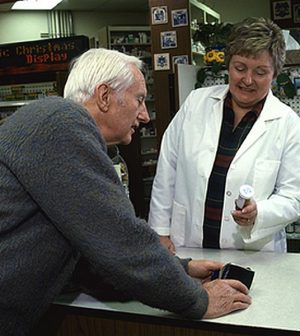- Could Your Grocery Store Meat Be Causing Recurring UTIs?
- Are You Making This Expensive Thermostat Error This Winter?
- Recognizing the Signs of Hypothyroidism
- 10 Strategies to Overcome Insomnia
- Could Artificial Sweeteners Be Aging the Brain Faster?
- Techniques for Soothing Your Nervous System
- Does the Water in Your House Smell Funny? Here’s Why
- Can a Daily Dose of Apple Cider Vinegar Actually Aid Weight Loss?
- 6 Health Beverages That Can Actually Spike Your Blood Sugar
- Treatment Options for Social Anxiety Disorder
Enlist a Pharmacist to Help Manage High Blood Pressure

High blood pressure is one of the biggest risk factors for heart disease and stroke, yet has no symptoms of its own. That’s why having your blood pressure checked regularly is a must, as is controlling it if it’s high.
But identifying the right high blood pressure drugs can be a challenge. According to research from the University of Iowa, having a pharmacist on your medical care team could help.
The researchers found that when a doctor’s practice included a pharmacist, patients received more frequent medication adjustments — that’s often key to determining the right combination of drugs in the right doses to lower blood pressure. These patients had more tailored medication regimens than patients who relied on their doctor alone.
It’s important to reiterate that these pharmacists were part of medical practices and not neighborhood pharmacists in drugstores, who may not have strong working relationships with area physicians.
But even if your care team doesn’t have a pharmacist on staff, your local pharmacist can be a great source of information. He or she can monitor your blood pressure, do cholesterol and glucose screenings, show you how to use a home blood pressure monitor, and understand the results.
Pharmacists can also help you choose and correctly use over-the-counter medications so they won’t cause any negative interactions with your blood pressure drugs. The nasal decongestant pseudoephedrine, antihistamines and items with caffeine are of particular concern.
Pharmacists are trained to do far more than dispense medications, so don’t overlook the insights that they can offer.
More information
The U.S. Centers for Disease Control and Prevention has more on how to work closely with your pharmacist to achieve better health.
Source: HealthDay
Copyright © 2026 HealthDay. All rights reserved.










